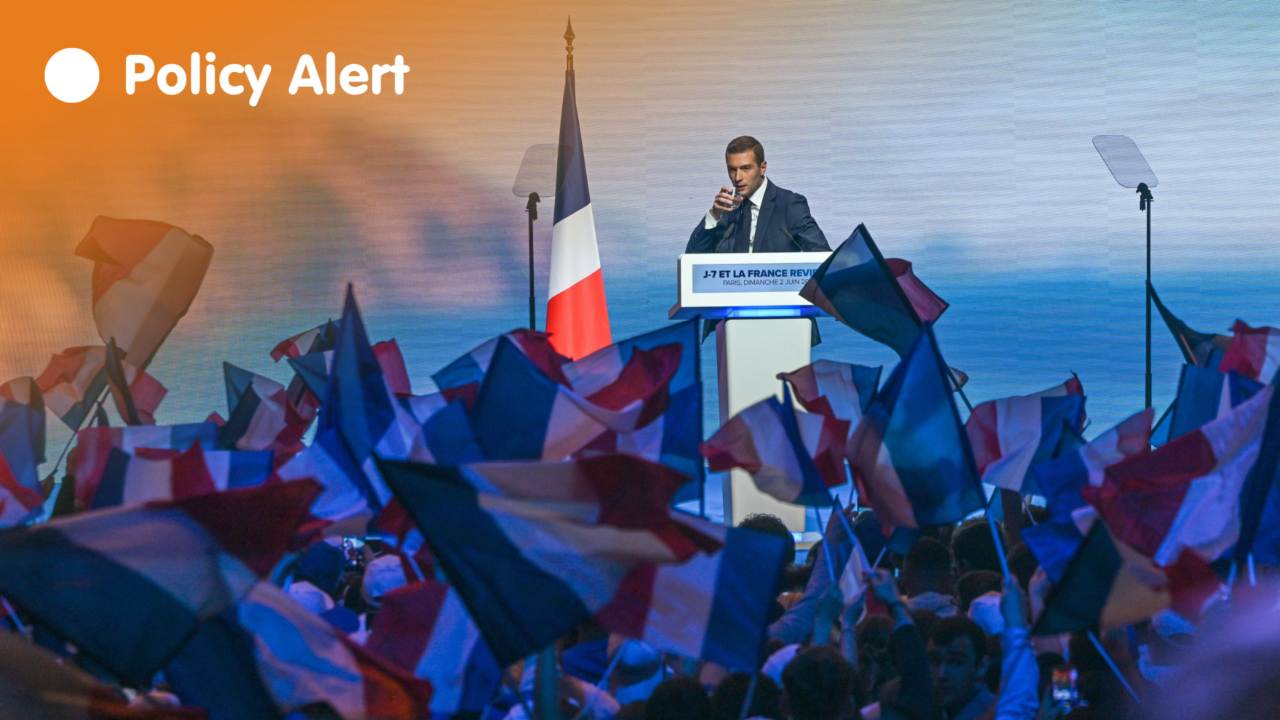France's fallout: The foreign policy consequences of the far right's ...
The far-right National Rally is leading the polls ahead of the second round of the French election. Its success would have inevitable consequences for French foreign policy

Jordan Bardella, President of the National Rally (Rassemblement National, RN), a French nationalist and right-wing populist party, photographed during a pre-European Parliament election event
Image by picture alliance / NurPhoto | Artur Widak
©France is on the cusp of a seismic political shift as voters head to the polls for the second round of the snap election for the National Assembly on 7 July. The far-right National Rally (RN) is leading the polls, and could emerge with a near or absolute majority in the assembly, making its leader Jordan Bardella prime minister in a cohabitation with President Emmanuel Macron. Alternatively, it could find itself as the largest parliamentary group, though without a majority, resulting in Macron leading a minority government. Either of these outcomes would have serious consequences for France’s domestic and foreign policies.

In a minority government, Macron would maintain leadership on foreign policy, but likely face frequent legislative gridlocks. This would narrow his margins for manoeuvre, hampering effective governance and weakening France’s voice on the European and international stage.
In a cohabitation, Macron would still retain several key prerogatives, including as commander-in-chief of the armed forces and over the negotiation and ratification of treaties. However, the prime minister would have core national defence responsibilities, as well as control over the budget and the administration. While previous French cohabitation governments have seen the president maintain a strong grip on foreign and defence policies, the RN’s radical stance could challenge this tradition, creating fragmented or inconsistent foreign policies and friction in their implementation.
Policy decisions on Ukraine and the appointment of the next French European commissioner are potential first flashpoints.

Ukraine
Bardella’s recent statements about defending Ukraine, remaining in NATO’s command structure for “as long as the war lasts”, and preventing Russian interference suggest the RN might initially seek a minimal consensus with Macron to avoid directly disrupting European unity and alienating international allies.
However, the RN’s core ideology, characterised by nationalism, anti-Americanism, scepticism towards the European Union and NATO, admiration for Russia as a bastion of traditional European values, and ambiguous relationship to the Kremlin, could push France towards a more isolationist and adversarial foreign policy. The RN’s “Melonisation” cannot be taken for granted.
EU integration
The RN’s vision of a “Europe of nations” stands in stark opposition to deeper EU integration. Its proposals, including re-establishing internal borders, favouring French companies in procurement contracts, and altering energy pricing, conflict with EU rules and could cause significant tension with EU institutions.

The RN’s opposition to the European Green Deal and the Pact on Migration and Asylum, as well as Bardella’s promise to cut down France’s annual payments to the EU further highlight its Eurosceptic agenda. Finally, its preference for national solutions to defence over European collaboration, and its criticism of Macron’s efforts to “Europeanise” French deterrence reflect a broader reluctance to engage in EU initiatives.
Macron’s manoeuvresAn RN majority or near majority after the election would mark a pivotal moment in French politics. Constitutionally, Macron could call a new election after a year to try to regain control, while the RN may push for his resignation. The resulting gridlock would likely diminish France’s leadership in European affairs and complicate its economic and political landscape. While the 2027 presidential election could offer a chance to restore stability, that will depend on whether the RN makes further progress on its ascent to power.
The European Council on Foreign Relations does not take collective positions. ECFR publications only represent the views of their individual authors.
Head, ECFR ParisSenior Policy Fellow
Distinguished Policy Fellow
Deputy Head, Paris OfficePolicy Fellow









































